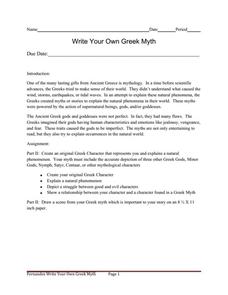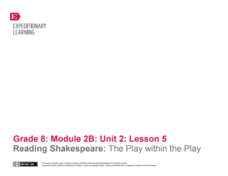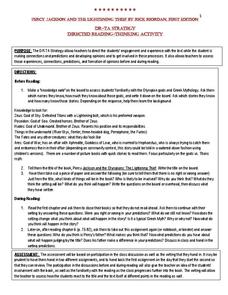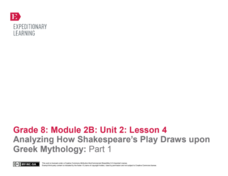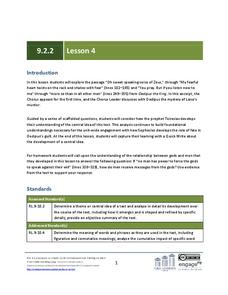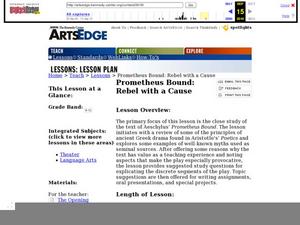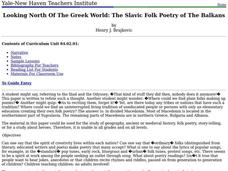Frost Middle School
Write Your Own Greek Myth
Invite your pupils to create original Greek characters and myths for their characters to star in. Similar to a traditional Greek myth, the story must explain a natural phenomenon, depict a struggle between good and evil characters, and...
EngageNY
Summarizing Complex Ideas: Comparing the Original UDHR and the "Plain Language" Version
The eighth lesson plan in this series continues the focus on vocabulary and increasing young readers' awareness of academic language. Pairs of learners participate in a short vocabulary review activity called Interactive Words in which...
EngageNY
Analyzing How Shakespeare’s Play Draws upon Greek Mythology: Part 2
Pupils explore the narrative structure of a piece of literary text, mapping out the plot structure of the Greek myth "Pyramus and Thisbe." Next, they use their completed graphic organizers to write story summaries.
School District No. 43
Writing a Greek Myth
Ask your learners to dream up a myth set in modern day. These mythology writing prompts require individuals take on the role of an ancient Greek citizen who just woke up to a totally different world. Through this lens, class members...
Oxford Cambridge
Classical Greek: Set Text Guide Sophocles Antigone
Check out this 21-page text guide if Sophocles' Antigone is part of your course content. Packed with background information, suggested talking points, and activities, the guide is a must-have for instructors using the Greek tragedy.
Utah Education Network (UEN)
Greek and Latin Roots- Introduction
Improve vocabulary by reviewing Greek and Latin roots with your ELA class! A fun and easy way for your class to memorize roots, groups are given a set of nine roots and nine definition cards which they must then match. Encourage groups...
EngageNY
Reading Shakespeare: The Play within the Play
Scholars continue reading the Greek myth "Pyramus and Thisbe," analyzing why it was written into Shakespeare's A Midsummer Night's Dream. Next, they complete a Venn diagram to compare the two texts.
EngageNY
Grade 9 ELA Module 2, Unit 2, Lesson 3
The manipulation of time is one of the most essential elements in Sophocles' Oedipus the King. As your language arts class participates in a jigsaw discussion activity, they work together to analyze the play's plot structure and...
Curated OER
The Lightning Thief: Directed Reading-Thinking Activity
Before diving into the engaging tale of Percy Jackson and the Lightning Thief by Rick Riordan, conduct this directed reading and thinking activity. Assess your pupils' knowledge of Greek gods and mythology through a knowledge web,...
EngageNY
Analyzing How Shakespeare’s Play Draws upon Greek Mythology: Part 1
Scholars read the story "Pyramus and Thisbe," analyzing word choice, tone, and meaning. They then try to find the gist of the story and discuss how Shakespeare used the myth in his play A Midsummer Night's Dream.
EngageNY
Analyzing How Shakespeare’s Play Draws upon Greek Mythology: Part 3
How do the narrative and play versions of the myth "Pyramus and Thisbe" affect meaning? Scholars reread Act 5, Scene 1 from Shakespeare's A Midsummer Night's Dream and compare its structure to "Pyramus and Thisbe." Next, they use a...
Core Knowledge Foundation
Greek And Latin Root Words
Students examine Greek and Latin root words. They research the history of the English language, solve word games and puzzles, write paragraphs about the impact of Greek and Latin on the English language, and create flip chart study guides.
EngageNY
Grade 9 ELA Module 2, Unit 2, Lesson 4
The concept of sight, whether it's a lack of sight or abundant sight of the future, plays a vital role in Sophocle's Oedipus the King. Develop your ninth graders' literary vision with a lesson that connects the prophecy of Teiresias to...
Florida Center for Reading Research
Vocabulary: Morphemic Elements, Getting to the Root of It
Young readers learn how to get at the root of new vocabulary with this fun language arts activity. When working in pairs, children begin by matching unknown vocabulary words to their Greek or Latin roots. When all the vocabulary cards...
Curated OER
Root Words from Greek and Roman Gods' Names
Prepare a stack of index cards with a Greek or Roman god's name on one side and their description on the other. Then, use the worksheet attached to brainstorm as many words that contain the root from each card. Pupils also create their...
EngageNY
Grade 9 ELA Module 2, Unit 2, Lesson 19
Now that readers can see the full scope of Sophocles' Oedipus the King, they can draw connections between the dramatic ending and the textual evidence throughout the Greek tragedy. As they prepare for the unit assessment writing prompt,...
EngageNY
Leaving the Play: All’s Well That Ends Well
How does Shakespeare develop the theme of control in A Midsummer Night's Dream? Using the resource, scholars analyze the theme of parental control in the play and the Greek myth "Pyramus and Thisbe." Next, they talk to partners to...
Curated OER
Prometheus Bound: Rebel with a Cause
If you are teaching Aeschylus' Prometheus Bound, you can't afford to miss this source. An extensive list of ideas outlines numerous discussion topics, writing prompts, comprehension questions, oral presentations, and projects. Have class...
EngageNY
Exploring Allusions to Myths in The Lightning Thief: Close Reading Part 1 of “Prometheus”
It's all just an allusion. Scholars learn the meaning of allusion and read an allusion in The Lightning Thief. Learners gather in their triads and discuss questions from the text to take a close look at vocabulary words and choose...
KIPP 3D Academy
Epic Poetry Unit
The Odyssey is the core text in this unit study of the hero's journey motif. Along the way, kids research Greek and Roman history, mythology, art, and epic poetry. The 104-page packet is perfect for homeschool or classroom situations and...
Curated OER
Looking North Of The Greek World: The Slavic Folk Poetry of The Balkans
Showing how folk poetry keeps alive national heritage is the stated goal of this proposal for a unit on the poetry of the Balkans.
Curated OER
Mythological Word Origins
Review myths and the characters therein, connecting them to vocabulary words in the English language today. Begin by searching online for myths and character names. With at least ten names that are familiar English words, students use...
Curated OER
Mythological Word Origins
No wonder the ship was called the Titanic. An investigation of Norse, Roman, and Greek Mythology provides insight into mythological characters and corresponding words in the English language. A close look at roots, prefixes, and suffixes...
Curated OER
Sophocles' Oedipus the King
Introduce your class to the Greek tragedy with a study of Sophocles’ Oedipus the King. Learners examine the features of a Greek tragedy, Sophocles’ achievements and contributions, and the universal themes that make the drama an...


